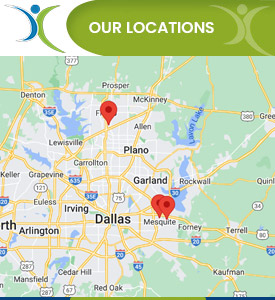When Should You Seek Treatment for Knee Arthritis?
Knee joint arthritis is a severe, painful illness that worsens with age. It occurs when the protective cartilage that protects the bones wears away. Dr. Andrew H. Morchower, M.D., M.P.H., at OmniSpine Pain Management, offers efficient knee arthritis treatment to help you minimize pain, swelling, and stiffness caused by arthritis. For more information, contact us or book an appointment online. We have convenient locations to serve you in Frisco, TX, Sunnyvale, TX, and Mesquite, TX.




Table of Contents:
What is knee arthritis?
What is the knee joint?
What are the types of arthritis of the knee?
What does arthritis of the knee affect?
Knee arthritis is a common chronic condition characterized by knee joint cartilage degeneration. In knee arthritis, the joint’s cartilage gradually wears down over time. This degeneration leads to joint pain, stiffness, and swelling. These symptoms often result in limited mobility and difficulty performing daily activities. Knee arthritis can be caused by numerous factors such as age, genetics, obesity, previous knee injuries, and repetitive stress on the joint.
Knee arthritis symptoms include pain, tenderness, stiffness, a feeling of grinding or popping in the knee, swelling, and reduced range of motion. In many cases, symptoms worsen with physical activity and improve with rest. As knee arthritis is a chronic condition, various treatment options are available to manage the symptoms and improve your quality of life. These include conservative measures like physical therapy, pain medications, assistive devices, weight management, and lifestyle modifications. In more severe cases, surgical interventions such as knee replacement surgery may be recommended.
The knee joint is one of the largest and most crucial joints in the body. It’s responsible for supporting our weight and facilitating movement in the lower extremities. This important joint is formed by the articulation of three bones, the femur (thighbone), tibia (shinbone), and patella (kneecap). These bones are held together by a network of ligaments, tendons, and muscles that provide stability.
Within the knee joint, there are two types of cartilage. Articular cartilage covers the ends of the femur, tibia, and back surface of the patella. This provides a smooth and slippery surface for the bones to glide against each other during movement. The meniscal cartilage, two C-shaped pieces of cartilage, acts as shock absorbers and helps with load distribution within the joint. The knee joint also contains synovial fluid, a lubricating fluid that protects the joint surfaces and reduces friction during movement.
Overall, the knee joint is a remarkable structure that allows for flexion, extension, and rotation of the lower leg.
Several types of arthritis can affect the knee joint, each with its characteristics and causes. The two most common types of arthritis that affect the knee are osteoarthritis and rheumatoid arthritis.
● Osteoarthritis (OA) – This is the most common form of knee arthritis. It occurs when the protective cartilage that cushions the ends of the bones in the knee joint wears down, causing pain, stiffness, and swelling. Osteoarthritis is often seen in older individuals and people with a history of knee injuries.
● Rheumatoid arthritis (RA) – Unlike osteoarthritis, rheumatoid arthritis is an autoimmune disease that causes inflammation and joint damage throughout the body. It is characterized by chronic inflammation, pain, stiffness, and swelling. Rheumatoid arthritis typically affects multiple joints and can lead to joint deformity if left untreated.
Other less common types of arthritis that can affect the knee include gouty arthritis, post-traumatic arthritis, and reactive arthritis.
Knee arthritis can significantly impact daily life and mobility. The condition causes various symptoms and limitations, including:
● Pain – Arthritis causes pain in the knee joint, which can range from mild discomfort to severe and debilitating pain. The pain may be constant or worsen during physical activity, making it difficult to perform regular tasks and enjoy activities.
● Swelling – Inflammation associated with knee arthritis can lead to swelling and tenderness around the joint.
● Stiffness – Arthritic knees are often challenging to fully bend or straighten. This stiffness can limit mobility and affect walking, climbing stairs, and participating in physical activities.
● Limited range of motion – As arthritis progresses, the knee joint’s range of motion becomes limited.
● Functional limitations – Arthritis of the knee can impact daily activities such as walking, running, standing, and even simple movements like getting up from a chair or bed. The condition interferes with work, hobbies, and overall quality of life.
Proper diagnosis, treatment, and management of knee arthritis are essential to minimize pain and maintain mobility.
Knee arthritis can have an impact on performing everyday tasks. Variations in the cartilage, bone, and soft tissues of the knee can cause discomfort and stiffness. Treatments for knee arthritis are available at OmniSpine Pain Management. For more information, contact us or book an appointment online. You can visit us at our clinics located in Frisco, TX, Sunnyvale, TX, and Mesquite, TX. We serve patients from Dallas TX, Frisco TX, Mesquite TX, Sunnyvale TX, Plano TX, Garland TX, Forney TX, Cedar Hill TX, Denton TX, Balch Springs TX, and surrounding areas.
Check Out Our 5 Star Reviews






